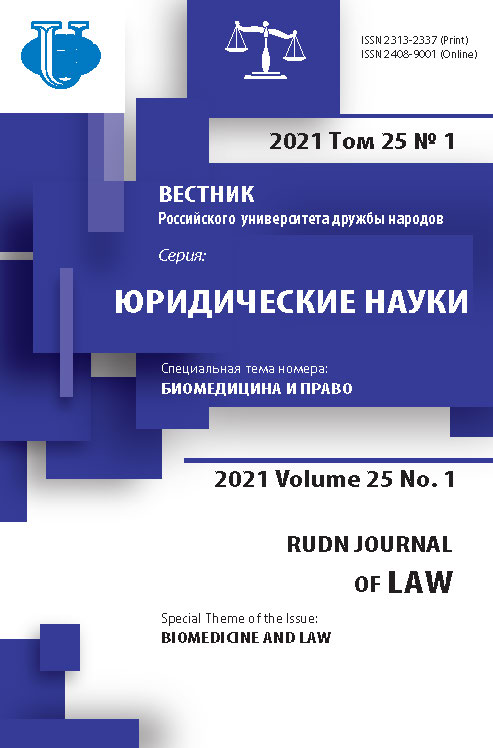Human rights and women's reproductive health in the countries of Latin America
- Authors: Mustafa G.A.1
-
Affiliations:
- “XII ASR” company
- Issue: Vol 25, No 1 (2021): BIOMEDICINE AND LAW
- Pages: 164-178
- Section: HUMAN REPRODUCTION AND HUMAN RIGHTS
- URL: https://journals.rudn.ru/law/article/view/26041
- DOI: https://doi.org/10.22363/2313-2337-2021-25-1-164-178
- ID: 26041
Cite item
Full Text
Abstract
The problem of induced termination of pregnancy has been a burning issue for mankind for centuries. An analysis of doctrine and legislation demonstrates that there is no consensus on this issue. The problem of induced termination of pregnancy is defined by ethical, religious, medical, social and legal aspects, which is also associated with the uncertainty of the legal status of the embryo. The aim of the study is to analyze the legislation of Latin American countries regarding the legal regulation of abortion, in order to verify its compliance with the fundamental rights - the right to life, the right to health and the right to inviolability. Special scientific methods were used in the research: comparative law, legal and technical methods. The relevance of the problem stems from the need to solve the controversial issue of legalization of artificial termination of pregnancy. The existence of disagreement lies in the lack of a unified approach in seeking to resolve this situation.
About the authors
Gular A. Mustafa
“XII ASR” company
Author for correspondence.
Email: gularmustafa@gmail.com
Counsel
Sabit Rakhman str. Baku, AZ 1110, Republic of AzerbaijanReferences
- Alviar García, H. & Jaramillo Sierra, I.C. (2012) Feminismo y crítica jurídica. El análisis distributivo como alternativa crítica al legalismo liberal. Bogotá, Siglo del Hombre. (in Spanish)
- Barraza Morelle, C. & Gómez López, C. (2009) Un derecho para las mujeres: la despenalización parcial del aborto en Colombia. Bogotá, La Mesa por la Vida y la Salud de las Mujere. (in Spanish)
- Bergallo, P. & González Vélez, A.C. (2012) Interrupción legal del embarazo por la causal violación. Enfoques de salud y jurídico. Bogotá, La Mesa por la Vida y la Salud de las Mujeres y otros. (in Spanish)
- Cabal, L. & Todd-Gher, J. (2009) Reframing the Right to Health. Legal Advocacy to Advance Women’s Reproductive Rights. In: Prioritizing Women’s Health. pp. 120-138. Available from: https://www.erweiterungsbeitrag.admin.ch/dam/eda/en/documents/aussenpolitik/mensche nrechte-menschliche-sicherheit/07_453_Cabal_Gher.pdf [Accessed 28th November 2020]
- Casas, L., Cordero, R. & Espinoza, O. (2009) Defensa demujeres en el nuevo sistema procesal penal. Santiago, Defensoría Penal Pública. (in Spanish)
- Casas, L. & Vivaldi, L. (2013) La criminalización del aborto como una violación a los derechos humanos de las mujeres. Informe Anual sobre Derechos Humanos en Chile. Santiago. Universidad Diego Portales. (in Spanish)
- Casas, L. & Vivaldi, L. (2014) La Penalización del Aborto Como una Violación a Los Derechos Humanos de las Mujere. pp. 69-120. Available from: https://clacaidigital.info/bitstream/ handle/123456789/527/udp_La%20penalizaci%c3%b3n%20del%20AbortoDDHH2013.pdf ?sequence=5&isAllowed=y (in Spanish) [Accessed 25th November 2020]
- Cea Egaña, J.L. (2012) Derecho Constitucional Chilen. T. II, Santiago de Chile, Universidad Católica. (in Spanish)
- Clapham, A. & Robinson, M. (2012) Realizing the Right to Health. Zurich, Ruffer & RuB, Sachbuchverlag
- Drovetta, R.I. (2015) Safe Abortion Information Hotlines: An Effective Strategy for Increasing Women's Access to Safe Abortions in Latin America. Reproductive health matters. 23(45), 47-57. Available from: https://doi.org/10.1016/j.rhm.2015.06.004 [Accessed 27th November 2020]
- Garay Zarraga, A. (2016) El Derecho al Aborto Ante la reacción patriarcal. Casos emblemáticos de la violación de los derechos humanos de las mujeres en relación al aborto en América Latina. Bilbao, Mundubat. Available from: https://clacaidigital.info/bitstream/handle/ 123456789/720/Derecho%20al%20aborto%20ante%20reaccion%20patriarcal.pdf?sequen ce=5&isAllowed=y (in Spanish) [Accessed 27th November 2020]
- Galli, B. (2012) Los efectos de las restricciones jurídicas relacionadas a la penalización del aborto y otras barreras jurídicas al acceso de las mujeres a la salud sexual y reproductive. IPAS. (in Spanish)
- González, M. (2007) Abortos “on line”: Venta de Misotrol en Internet. Revista Nos. Available from: https://www.revistanos.cl/abortos-on-line-venta-de-misotrol-en-internet/ (in Spanish)
- Grosman, L.S., Legarre, S., Rivera, J.C. & Elias, J.S. (2014) Tratado de los derechos constitucionales. Buenos Aires, Abeledo Perrot. (in Spanish)
- Nunes, F.E. & Delph, Y.M. (1995) Making Abortion law reform happen in Guyana: а success story. Reproductive Health Matters. 3(6), 12-23. doi: 10.1016/0968-8080(95)90154-X [Accessed 7th November 2020]
- Paúl Díaz, Á. (2012) Estatus del no nacido en la Convención Americana: un ejercicio de interpretación. Ius et Praxis. 18(1), 61-112. (in Spanish)
- Peñas Defago, M.A. (2018) El aborto en El Salvador: tres décadas de disputas sobre la autonomía reproductiva de las mujeres. Península, 13(2), 213-234. (in Spanish)
- Vargas, G.M., Nazarit, P.S. & Sáez, S.M. (2008) Violencia sexual y aborto. Conexiones necesarias. Santiago, Red Chilena contra la Violencia Doméstica y Sexual. (in Spanish)
- Zamberlin, N., Romero, M. & Ramos, S. (2012) Latin American women's experiences with medical abortion in settings where abortion is legally restricted. Reproductive health, 9(1), 34. Available from: https://doi.org/10.1186/1742-4755-9-34 (in Spanish)
Supplementary files















